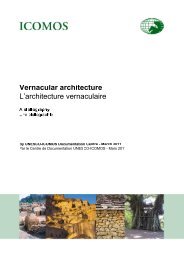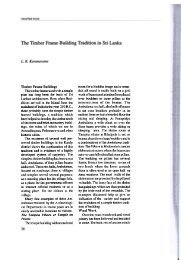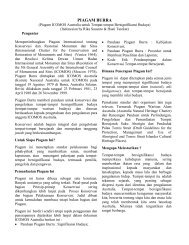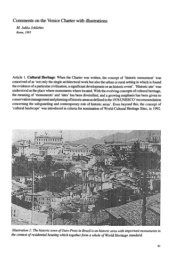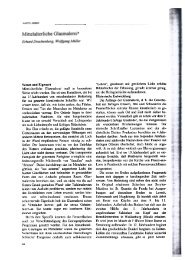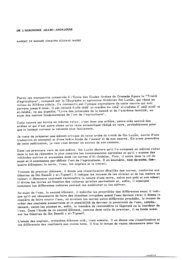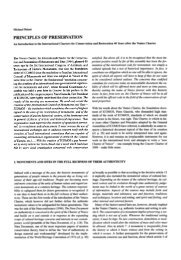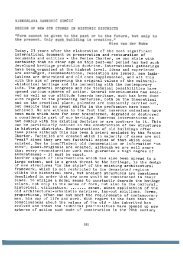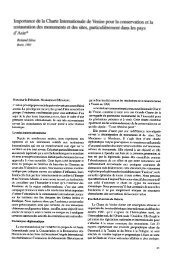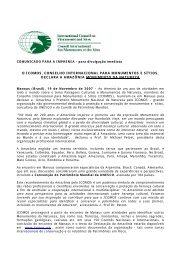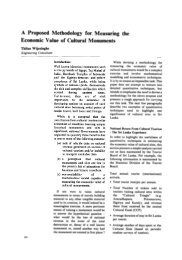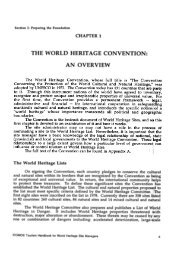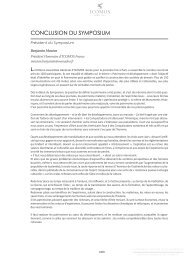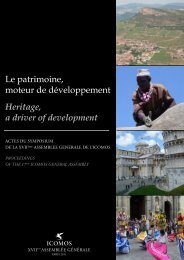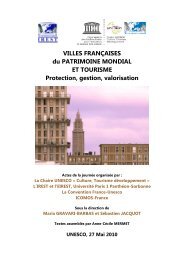PARTIE 2 - Icomos
PARTIE 2 - Icomos
PARTIE 2 - Icomos
You also want an ePaper? Increase the reach of your titles
YUMPU automatically turns print PDFs into web optimized ePapers that Google loves.
Theme 2<br />
Session 1<br />
Escuela Taller : A trainer's perspective<br />
outcomes that bring positive changes to people’s attitudes<br />
as well as strengthening their knowledge and<br />
skills.” (WHC 2010)<br />
Vocational training should be a foundation for opportunity<br />
and fulfilment in the workplace, a vehicle<br />
for the human potential and ingenuity that artisans<br />
and craftworkers, as well as designers and engineers,<br />
might profitably impart to the overall goals of economic<br />
and social growth. A feature of conservation<br />
practice is its basis in an open system of knowledge<br />
where observation, reflexion, trial and adaptation<br />
work in synthesis to correct imperfections and failures<br />
in a material or structure. This system draws on<br />
the dialogue between designer and constructor that<br />
is the essence of making. We often hear about how<br />
restoration initiatives help to train local craftsmen in<br />
traditional arts, ergo how such interventions impact<br />
materially on the preservation of traditional cultural<br />
practices and places. We know less about where this<br />
training leads them in terms of unlocking creative<br />
solutions to a range of modern challenges – technical,<br />
commercial, environmental. How are the skills<br />
acquired retained or expanded? What are the wider<br />
impacts on community development and income ?<br />
What are the risks and how worthwhile the investment<br />
?<br />
Escuela Taller Intramuros has encouraged more able<br />
students to obtain TESDA certification in two trades,<br />
such as masonry and plumbing. Under the present<br />
mandate, resources don't extend to follow-up actions<br />
to help graduates improve and diversify. Bright young<br />
craftworkers would benefit from training pathways<br />
that offer real scope to become more motivated and<br />
accomplished members of the workforce: heritage<br />
restoration requires skilled handworkers but also<br />
site foremen, trainers, entrepreneurs. Why not even<br />
think in terms of integrating what we think of as graduate-level<br />
competencies into their apprenticeship<br />
(building economics, preventive conservation, disaster<br />
preparedness) ?<br />
Demand and supply<br />
Demand for cultural heritage is a difficult thing to<br />
measure. We have often been called on to provide<br />
skills for renovation projects already up and running<br />
where demand is present but expertise lacking. Some<br />
of the strongest demand has come from the Catholic<br />
church. But demand is not uniform and increasing<br />
supply through training alone is not sufficient. Unless<br />
we want to “ghetto-ise” traditional building crafts in<br />
“historic cities” or world heritage centres, we should<br />
have a better idea of what jobs our trainees will do<br />
after graduation. We need a sound grasp of what part<br />
the heritage sector might eventually play in a local<br />
economy, what other sectors of the industrial or creative<br />
economies are relevant to the skills learned, and<br />
what other strategies we can devise to embed the<br />
manual arts more sustainably within the future socioeconomic<br />
fabric of developing cities and regions.<br />
A basic premise of the Escuela Taller system is that<br />
supply (labour) is created through a partnership model<br />
in which local partners provide access to sites or<br />
projects where expertise can be honed and tested,<br />
with direct preservation benefits. To some degree,<br />
the physical presence of a school, rather than a project-centred<br />
scheme, has added value. Press coverage,<br />
exhibitions, interpretation panels and site work<br />
in historic areas can have positive knock-on effects on<br />
the demand side. A school is an entity around which<br />
a fragmented and incoherent demand begins to coalesce,<br />
as we have observed in Manila.<br />
But sustainable solutions require a strategic approach<br />
to skills training. Philippine experience has<br />
shown that education targeting those outside the<br />
formal public schools system, led by local government,<br />
community organisations and NGOs with their<br />
diverse spectrum of objectives and beneficiaries, has<br />
lacked coordination (Di Grapello, Tan and Tandon<br />
2010). Our experience bears this out. Research input<br />
nationally and regionally, aimed at auditing relevant<br />
skills, identifying competency gaps, assessing markets,<br />
improving training strategy and coverage, and<br />
incorporating appropriate training into national/local<br />
cultural and environmental policies, is needed. On<br />
a broader level, structural failures in coordination<br />
between overlapping cultural agencies in government,<br />
each with their own values and approaches,<br />
are a serious constraint. No-one can operate in an<br />
environment where there is no effective consultation<br />
on standards and policies between different actors<br />
working in the heritage sector.<br />
Heritage in construction<br />
The conditions needed to integrate graduates like<br />
those of Escuela Taller into local labour markets are<br />
also poor. A major challenge is to incentivise specialist<br />
training in the construction sector, which has<br />
embraced the economics of scale and low-skilled<br />
casual labour like no other. While industrialisation is<br />
still at a fairly low level, there are opportunities for<br />
governments to build capacity within the SMEs who<br />
should be the mainstay of historic building repair and<br />
maintenance. We have experimented with using local<br />
contractors to improve work flow on project sites.<br />
260<br />
LE PATRIMOINE, MOTEUR DE DÉVELOPPEMENT<br />
HERITAGE, DRIVER OF DEVELOPMENT



